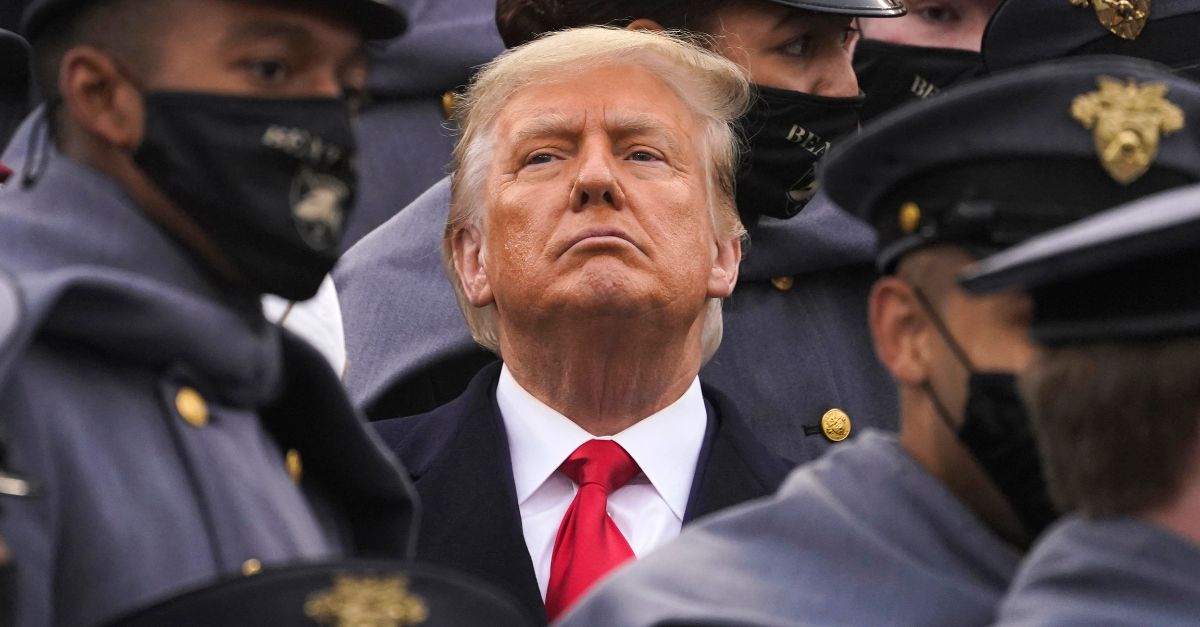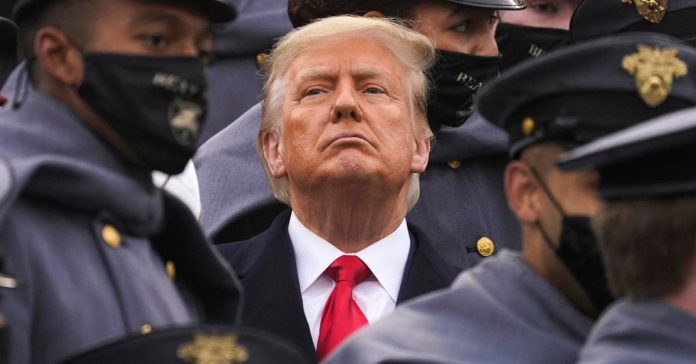
Surrounded by Army cadets, President Donald Trump watches the first half of the 121st Army-Navy Football Game, Dec. 12, 2020, in West Point, N.Y. (AP Photo/Andrew Harnik, File)
After a failed “fishing expedition” targeting the committee that investigated the Jan. 6 attack on the U.S. Capitol, lawyers for former President Donald Trump have now asked a judge to define the “scope of the prosecution” in his election subversion case in Washington, D.C., alleging that agencies from the Justice Department to the CIA have refused to provide him with evidence that could vindicate him.
In the 37-page motion filed Wednesday, former president Trump’s lawyers allege that “while it is true that the prosecution has produced a significant volume of material, it has intentionally and unlawfully declined to search for other exculpatory documents that are in its actual or constructive possession.”
Trump’s legal team says prosecutors must be forced to search high and low not just for any information or evidence that they have on hand at the special counsel’s office that could be used for his defense, but that they must also launch a search for such evidence to help him that he says is located at the FBI, the Department of Justice more broadly, the Department of Justice Office of the Inspector General, the National Archives Office of the Inspector General and the United States Postal Inspection Service.
Discovery obligations “extend to all of the office’s personnel,” the motion argues, and that encompasses anyone and any “component of the DOJ that participated in investigations relating to the 2020 election and January 6, 2021, federal agency components that participated in or assisted those investigations, and the records of the January 6 Committee,” wrote attorney Todd Blanche.
Under standard trial procedures, prosecutors are required to disclose exculpatory evidence, but Trump’s request under the Brady evidentiary obligations may be considered too broad by presiding U.S. District Judge Tanya Chutkan. She just last week denied his request for so-called “missing materials” from the congressional committee that investigated Jan. 6.
Blanche, in potential anticipation of an unfavorable ruling, cites findings from the case United States v. O’Keefe, in which he argues that “burdensomeness” and “logistical difficulty” and “concerns about the confidentiality and the privacy rights of others do not trump the right of one charged with a crime to prevent a fair defense.”
In O’Keefe, Blanche notes that the court there ordered prosecutors to search seven consular facilities in Canada and Mexico for evidence material to the defense.
Further, Trump’s lawyers asked Chutkan to order the special counsel’s office to “collect and disclose documents and information from “agencies whose personnel are likely trial witnesses or that assisted the investigations relating to the 2020 election and January 6.”
In those, there are several classified briefings or memorandum and interviews from a half-dozen or more agencies, Blanche argued, where people tied to those investigations should be forced to disclose. Portions of Wednesday’s motion were redacted by lawyers, specifically areas that appear to cite other classified supplements filed under seal in the case.
The Department of Defense, according to the former president, was directly tied to the events of Jan. 6 and is now in effect, “part of the prosecution team.”
So where prosecutors write in their indictment that Trump delayed his response to quell the rioting, they must also provide him with evidence to the contrary, Blanche notes, pointing to when Capitol Police and the D.C. Metropolitan Police Department contacted the National Guard during the rioting on Jan. 6, for example.
The motion also suggests that since special counsel “relied upon the judgement of a former Cybersecurity & Infrastructure Security Agency [CISA] director” Chris Krebs and others in the nation’s intelligence apparatus — who found there was no fraud in the 2020 election — they and the Department of Homeland Security must produce exculpatory records too.
Notably, Trump fired Krebs a week after the no-fraud finding in 2020.
Trump’s lawyers also have their eyes set on defense evidence they say is being held onto by the assistant director of the FBI field office in Washington in late 2021, Steven “Mike” D’Antuono.
Have a tip we should know? [email protected]

